The spirit of unity, protest, and empowerment will take to the streets once again as London Trans+ Pride returns to central London on Saturday 26 July 2025. Marking its seventh year, the grassroots-born movement has grown into one of the most powerful acts of solidarity for the trans+ community in the UK. This year’s theme, ‘Existence & Resistance’, could not be more relevant or necessary in the current climate, where trans+ lives are increasingly targeted by discriminatory legislation, negative media narratives, and social hostility.
This article may include affiliate links. Click here to read our full Affiliate Disclosure. If you make a purchase through one of these links, we may earn a commission at no additional cost to you.
Your Guide to London Trans+ Pride 2025:
London Trans+ Pride 2025: A Movement Fueled by Love, Unity, and Resistance
London Trans+ Pride is far more than just a march. It is a defiant declaration that trans+ people exist, resist, and deserve dignity, equality, and joy. Last year’s turnout broke records, with over 60,000 people standing together in the largest Trans Pride event to date. That same momentum is expected this year, as the urgency for action and allyship reaches new heights.

Understanding the Supreme Court Ruling and Its Implications
The 2025 event comes in the wake of a controversial UK Supreme Court ruling that redefined the term “sex” in the Equality Act 2010 to mean “biological sex”. This decision enables the exclusion of trans women from single-sex services—such as women’s restrooms, refuges, hospital wards, and sports teams, even if they possess a Gender Recognition Certificate—and has sparked significant fear and confusion within the trans+ community. Notably, the ruling was made without consultation from any trans-led organisations, highlighting the urgent need for vocal and visible allyship from cisgender individuals.
The legal challenge was brought forward by the gender-critical group For Women Scotland, which received a £70,000 donation from author JK Rowling to support their case. This move, framed as a defence of women’s rights, is in fact a targeted attack on trans people, undermining the principles of inclusivity and equality. Such funding and support from prominent figures have amplified anti-trans sentiments under the guise of protecting women’s rights, a stance that many view as a misrepresentation of feminist principles.

The ruling’s implications extend beyond the trans community, potentially affecting cisgender individuals who do not conform to traditional gender norms, such as butch lesbians and gender non-conforming people, not to mention proud intersex people and non-binary people, who may also face increased scrutiny and discrimination.
In response to the ruling, the Equality and Human Rights Commission (EHRC) issued interim guidance suggesting that trans individuals should use facilities corresponding to their biological sex. In some circumstances, trans people may be excluded from both women’s and men’s single-sex spaces, and instead be required to use non-gendered or separate facilities.
The EHRC has not specified what these “circumstances” entail, but members of the LGBTQ+ community have raised concerns that such policies target transgender men who have medically transitioned and may be mistaken for cisgender men, and vice versa for trans women. This opens the door for individuals—trans and cis alike—to be challenged about their gender in everyday situations, including while using public bathrooms or changing rooms.
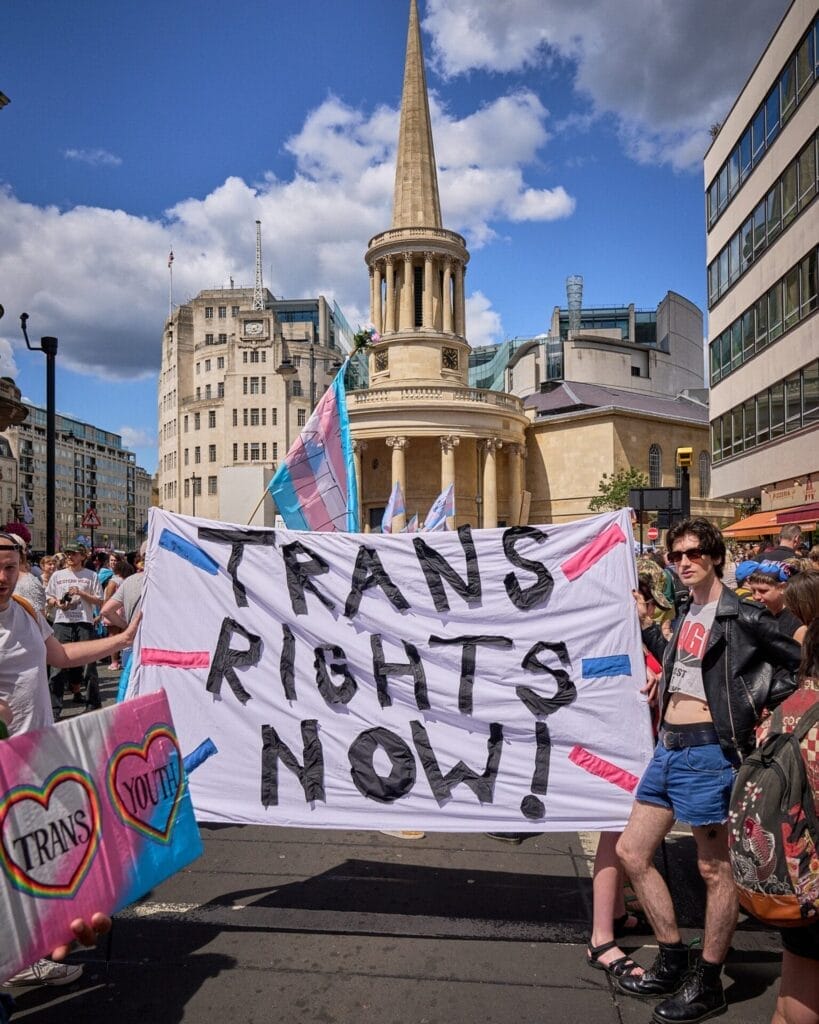
This guidance not only places an unfair burden on trans people to disclose or explain their gender identity but also creates a culture of suspicion where anyone not conforming to narrow gender norms may face scrutiny. It is scientifically flawed, as the Hudson Institute of Medical Research points out in their research into intersex people, to base such policies on the assumption that sex is binary and easily verifiable—chromosomes can vary (with conditions such as XXY or XYY), and most people have never undergone a chromosome test.
Gender identity is not something that can be determined by appearance or presumed “biological” traits. Cisgender individuals have already been subjected to suspicion and ejection from public restrooms in parts of the United States due to similar anti-trans legislation, as reported by them. The result is an increased risk of harassment, discrimination, and exclusion, as stated by GLAAD, for trans people—and for cisgender people, especially butch lesbians and gender non-conforming individuals, who may also be wrongly targeted under these policies.

The UK has witnessed significant public outcry in response to the Supreme Court’s decision. On 19 April 2025, thousands of people gathered in London to protest the ruling, with additional demonstrations taking place across the country. These protests underscore the widespread opposition to the erosion of trans rights and the solidarity among various communities in defending equality. We’re also glad to see many cisgender and LGBTQ+ allies attend these protests and continue to stand with the community.

Take Action: Support the Trans+ Community
For those looking to support the trans+ community, several actions can be taken:
- Contact Your MP: Advocate for policies that protect and uphold trans rights. Click here to find out who your MP is and you can use the Unite For Trans Rights template letter to get started by clicking here.
- Challenge the EHRC’s proposals: The Trans Legal Project outlines how you can take action against the EHRC’s interim guidance, including advice on raising concerns with your MP. Click here to access their resource.
- Join Protests and Demonstrations: Participate in public displays of solidarity to raise awareness and pressure policymakers. What The Trans?! maintains a list of upcoming protests across the UK.
- Supporting legal challenges: Organisations like the Good Law Project are fundraising to take the UK Supreme Court’s decision to the European Court of Human Rights, aiming to overturn the ruling and restore protections for trans people. You can contribute to their efforts through their crowdfunding page.
Charities Sound the Alarm Over Trans Rights
Leading LGBTQ+ charities, including Stonewall and the LGBT Consortium, have expressed deep concern over the UK Supreme Court’s recent ruling that interprets “woman” and “sex” in the Equality Act 2010 as referring exclusively to “biological sex”. In a joint letter to Prime Minister Keir Starmer, 14 national LGBTQ+ organisations warned that the decision effectively bans trans people from using facilities matching their gender identity, causing confusion and undermining their rights and dignity. They criticised the subsequent guidance from the Equality and Human Rights Commission, calling it a “significant overreach” and inconsistent with human rights obligations.

Legal Challenge Initiated by Good Law Project
In response to the ruling, the Good Law Project has launched a legal initiative to challenge the decision in the European Court of Human Rights. Supported by retired judge Victoria McCloud, the UK’s only transgender judge, the project argues that the Supreme Court’s interpretation violates essential legal principles by not hearing directly from affected parties. At the time of publication, the Good Law Project has already raised over £375,000 through crowdfunding to support this legal challenge.

Our Stance at Good Star Vibes
At Good Star Vibes, we stand firmly and unapologetically with the trans+ community. There is no LGB without the T. The ongoing fight for LGBTQ+ equality owes an immeasurable debt to the bravery and leadership of trans people—particularly black and brown trans women—who have always been at the forefront of queer liberation. From the Stonewall Riots of 1969, where trans icons such as Marsha P. Johnson and Sylvia Rivera helped ignite a global movement, to the present day where trans people continue to lead with courage and heart, their existence and resistance have paved the way for many of the rights we enjoy today.
We recognise that the trans+ community continues to be disproportionately targeted by regressive laws, misinformation, and violence. In both the UK and the US, trans rights are being actively rolled back—even as the broader LGBTQ+ community celebrates milestones like same-sex marriage and legal recognition. These rights were not granted—they were fought for. And they must be protected by all of us.
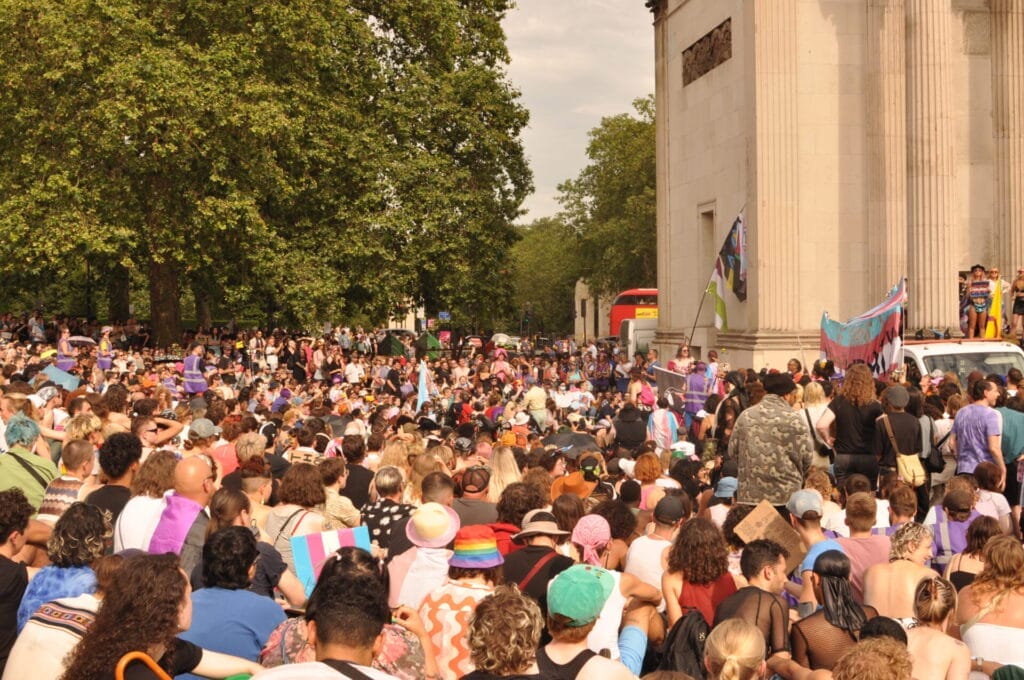
Our founder, Jonathan Currinn (he/him), stated: “The UK Supreme Court’s decision has eradicated trans rights in an instance. You would think such an important decision would’ve been based on facts, evidence, and statements, from both sides. Instead, they only heard from anti-trans organisations and even excluded trans people from the court case, including denying a former judge, who is a trans woman, from being heard. This ruling does not provide clarity, as Prime Minister Keir Starmer said, and in fact, brings more confusion and will likely lead to more discrimination against a marginalised group of society. Not to mention the fact that cis women are also now at risk of being discriminated against, threatened, or even attacked.”
He added: “To our trans brothers and sisters, we are here for you, we stand with you, you are not alone, and we will fight for your rights just like all the trans people in the past who fought for LGBTQ+ rights. It’s time for the rest of the community to stand up, show up, and support trans individuals and the rights that they deserve. With pride festivals just around the corner, expect our voices to be louder than ever; expect our marching pride parades to be more crucial than ever; and expect the queer community to express solidarity with the trans community wholeheartedly.”
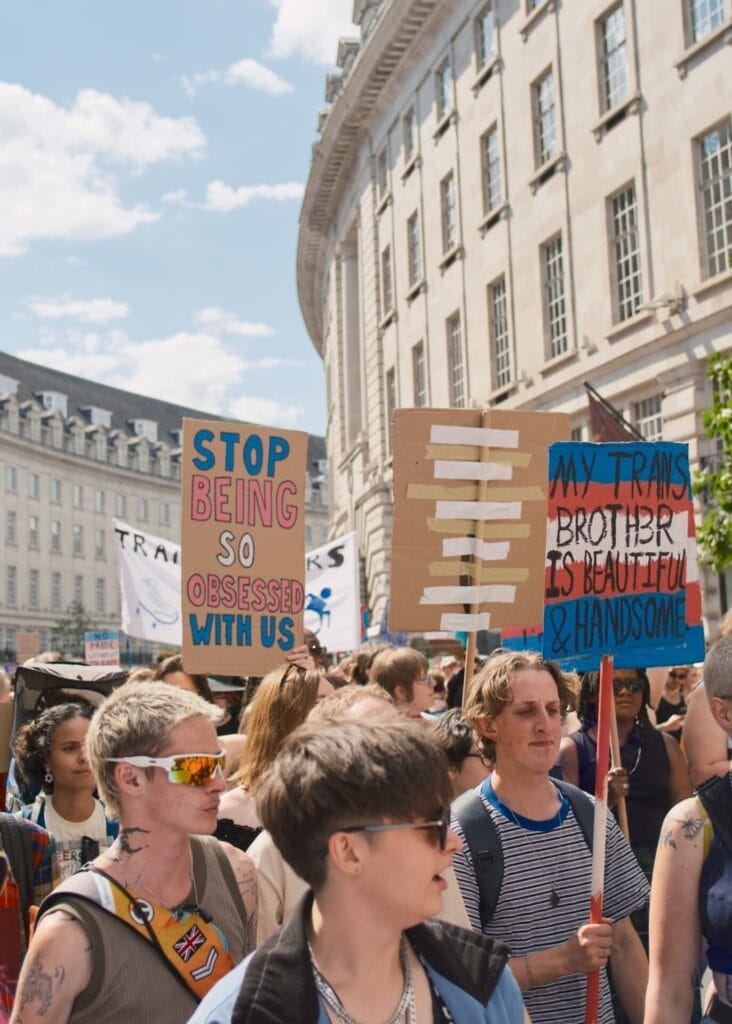
As a platform committed to equality, expression, and visibility, Good Star Vibes will always use its voice to uplift trans lives, amplify trans stories, and challenge the forces that seek to erase them. Pride was—and still is—a protest. We are proud to take a stand. We fully endorse and support the Good Law Project’s crowdfunder to take this to the European Court of Human Rights, and we completely encourage you to donate and share the project on your socials.
Voices of Support: Public Figures Stand with the Trans+ Community
In response, a wave of celebrities, activists, and public figures from music, politics, film, TV, and beyond have come forward to show their support, offering heartfelt messages of solidarity with the trans+ community.

Pop star Jessie Ware (she/her) said: “Trans rights are human rights. I proudly stand with the trans community—with love and respect, always.”
Actress and activist Jameela Jamil (she/her) offered her unwavering support, stating: “The trans community are leaders in freedom, passion, solidarity, and frankly, fun. It is in the best interests of our society to uphold and protect them. As they have always tried to uphold and protect others.”
Former Labour leader Jeremy Corbyn (he/him) remarked: “There has never been a more important time to turn up in solidarity with the trans community. Trans people are one of the most marginalised groups in society, but they are so much more than that. They are artists. They are writers. They are campaigners. Above all, they are human beings who just want to live in dignity and peace.”
Singer-songwriter Paloma Faith (she/her) delivered a passionate message: “I stand in solidarity with the trans community and always will. Trans rights are human rights and they deserve our protection, empathy and understanding. I despise that they are being used as scapegoats for human suffering when the source of it is actually the very people who try and brainwash people into discriminating against them. My heart goes out to all my trans friends, I am a proud and loving ally.”
Comedian and political figure Suzy Eddie Izzard (she/her) affirmed: “Women’s Rights are Human Rights and Trans Rights are Human Rights. End of story. We have to make this work.”
Actor Harris Dickinson (he/him) reflected on his experience: “Witnessing the strength, unity, and love at London Trans+ Pride was a powerful reminder of the importance of standing with the trans community—not just today, but every day. I stand firmly against the marginalisation, discrimination, and silencing of trans people.”
Pop icon Will Young (he/him) expressed: “I stand in full solidarity with all trans people. The political hijacking of your lives and bodies is driven by a minority, and please know that you are supported, cared for, and loved.”
Actor Russell Tovey (he/him) reinforced the need for unity: “No LGB without the T! Trans people deserve our love, safety, and respect and no amount of government rhetoric can erase their existence, no matter how hard they try. It’s on all of us to step up and show the world that we are not going backwards. The world spins forward, and so must we.”
Broadcaster Clara Amfo (she/her) reminded us of the importance of basic rights: “Trans people have always existed and should have the right to live peaceful, dignified and joyous lives. Their rights are human rights.”
Girls Aloud member Nicola Roberts (she/her) shared: “I fully support my trans sisters. I hope you continue to find the strength to be authentically yourself and keep inspiring us all.”
Model and activist Munroe Bergdorf (she/her) said: “With British trans people facing so much uncertainty on how our day-to-day lives will change following the Supreme Court ruling and subsequent EHRC guidance. It’s essential that as many of us as possible take to the streets in protest, to show our pride and that we will not be erased, shamed, segregated or forced back into the margins. Watching London Trans Pride grow year on year is both a reminder that trans people aren’t going anywhere, and that our allies see through the relentless, nonsensical, transphobic culture war targeting our community through British politics and much of the media.”
Scissor Sisters frontman Jake Shears (he/him) said: “They can pass all the rulings they want! Queer and Trans folk are not going anywhere.”
Singer Alison Goldfrapp (she/her) offered: “To be yourself in a world that tries to erase you is defiant and beautiful. I see you, I support you, I celebrate you.”
Beloved pop group Steps delivered a touching group statement: “To our trans family: You are seen, you are valued, and you are deeply loved. We stand with you, today and always. Your strength and beauty inspire us all.”
Actress Lydia West (she/her) shared her hope: “I stand with all trans people in the fight for equality. Now more than ever we must fight in peace against violence, sexism, and hatred for all trans people.”
DJ and producer Honey Dijon (she/her) declared: “No amount of legislation will ever erase or silence trans people, we have always been here and will continue to exist outside of an antiquated oppressive system known as the patriarchy.”
Pop star Rina Sawayama (she/her) described the event as essential: “London Trans Pride is a beautiful annual event of joy, protest, love and more. It is now, more than ever, vital that we support the trans community by any means possible—they are one of the most marginalised groups of people in the UK and in recent years they have been under near constant attack from all sides and enough is enough. I implore people from across the UK to turn up this year (be it physical or financial) to show the anti-trans lawmakers, politicians and hate groups that they are on the wrong side of history and that trans people are loved and supported universally.”
Poet and performer Travis Alabanza (they/them) said: “Every year, the importance of this march grows and grows. With this year seeing in the UK both our two major political parties consistently using trans people as scapegoats for misinformation and harmful rhetoric, it is more vital than ever we show up and remind this country that we are a community who deserve respect, love and safety—and that there are many who agree with this. Trans pride continues to be the best day in the calendar year. Where our hurt, anger and demands for justice are blended with love, community & a reminder of the power of solidarity.”
Youth-led group Trans Kids Deserve Better (TKDB) issued a statement full of urgency: “The Supreme Court Ruling is not unique, or unexpected. Our rights have been under attack for a long time and we will not sit by and let the world kick us into the ground. The only solution to our despair is action. We need to remember why we are here. Pride is a protest, and was fought for by generations of unheard trans people. TKDB recognises the power of Trans Pride, and the privilege to have a chance to be loud, and to be ourselves.”
They continued by stating: “But we will have nothing left if we do not continue the fight of the generations before us—don’t stop at London Trans Pride! Support your most vulnerable communities: trans kids, black trans women, disabled trans folks; we are the fight, and we are the future. Finally, stop saying ‘Protect Trans Kids’—you haven’t, and we’ve been left to protect ourselves. Stop with the empty phrases! Stand up! Fight back!”
Dani St James (she/her), founder of the trans charity Not A Phase, summed it up: “It goes without saying that there has never been a more urgent time for allyship. At home and abroad, our community is under attack. This year, I’m asking you to go beyond performative support and do the work: stand with us, donate to trans-led organisations, speak out against injustice, and most of all, listen to trans voices.”
Voices from Within: The London Trans+ Pride Team Speaks Out
In addition to support from public figures and celebrities, the London Trans+ Pride team themselves have issued a series of powerful and deeply personal statements, responding to the Supreme Court ruling and affirming the necessity of this year’s march.
Lewis G. Burton (they/them), founding member of London Trans+ Pride, addressed the profound impact of the ruling on the wider community:
“This year’s Supreme Court ruling has caused confusion, grief, and real harm—not just for trans people in the UK, but for our communities globally. The judgement erases the realities of intersex people, ignores the lived experience of trans, non-binary and gender-diverse people, and reinforces the idea that only a narrow, outdated definition of womanhood deserves legal protection.
The Court didn’t hear from a single trans organisation. Instead, it sided with a well-funded, vocal minority committed to stripping us of our rights. We want to be clear: this ruling deepens the fracture of trust between the LGBTQ+ community and the Labour Party—a party many of us once looked to for protection. It’s hard to feel hope when we are met with silence, or worse, complicity.
This year’s theme is ‘Existence and Resistance’ because every day we live our lives with dignity and joy is an act of protest. We march to remind our siblings that they are not alone—that despite the cruelty of this government and the noise of a few hundred bigots, we are still here. We are a natural, eternal part of humanity. You cannot legislate us out of existence. We don’t want special treatment—we want to live in peace, to love freely, to build our futures without fear. That is not too much to ask.”
Mx. Adam Khan (xe/them) highlighted the growing strength and reach of the Trans Pride movement:
“Marching to reclaim our streets is more important now than ever, as our community has continually seen its rights rescinded in the UK and across the world for years. Despite this, the Trans Pride Movement is spreading trans joy and rage like wildfire. We are a record-breaking, integral part of the Trans Pride movement, which this year will see 30 Trans Prides organise across the UK and Ireland.”
Sukey Venables-Fisher (she/her) reflected on the importance of accessibility within the community-led movement:
“This is a community with many intersections and our march belongs to all of us: we don’t have an access policy because it’s a requirement, it’s a first building block to how we design our march and a good proportion of our organising group have disabilities ourselves. Because LT+P is growing so fast, we know what was ok last year won’t be good enough this year. We talk often to participants to find what works and what doesn’t, and explore new ways to broaden access to the point where no trans person will ever be excluded.”
EM Williams (they/them) spoke about the emotional and symbolic power of this year’s march:
“’Existence and Resistance’ is about human beings. It’s about championing compassion and kindness over hate and darkness. We are marching for families. Marching for those who never had the words until now.
Marching with those who are quietly existing with their loved ones over a cup of tea, and/or loudly resisting, amplified and immortalised. Our existence is a protest, right now it has to be. And we will march in resistance until we only have to march in joy and recognition. I march for a time when every person who finds themselves within the LGBTQIAA+ umbrella, every person whose identity is ricocheted between tabloids and headlines, feels like they can answer the question ‘Who are you, what’s your story?’ without pause, without fear.”
🏳️⚧️ What the Community is Calling for
Despite being promised in 2018, the UK government has still not implemented a full ban on conversion therapy—and proposals that exclude trans people are seen by campaigners as a betrayal. At the same time, access to trans healthcare is being increasingly restricted. One of the most controversial developments has been the ban on prescribing puberty blockers to trans children, even though the same medication continues to be used for cisgender children experiencing precocious puberty.
This disparity has raised serious concerns about medical ethics and the unequal treatment of trans youth. London Trans+ Pride is demanding a reversal of these restrictions, alongside fully funded and accessible gender-affirming care. Campaigners are calling for shorter waiting times, access to trans healthcare for both young people and adults, and NHS guidance that empowers GPs to support trans patients rather than deterring them.
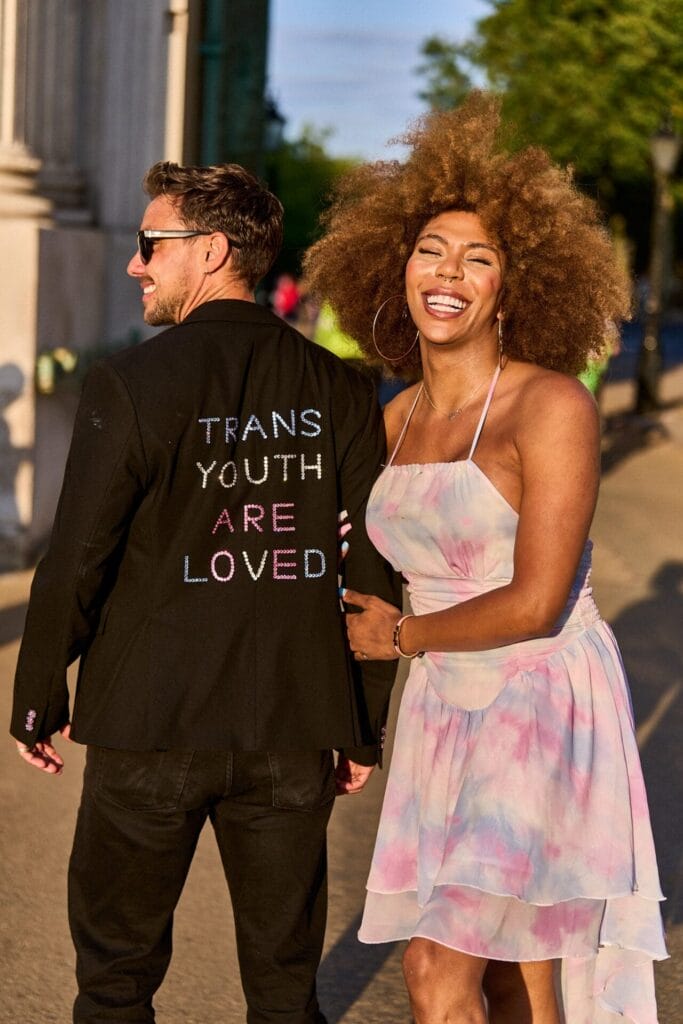
Why Trans Liberation Must Include Everyone
Organisers of London Trans+ Pride stress that trans+ liberation is inextricably linked to other forms of justice—including disability rights, racial equality, and economic support. With rising poverty levels, cuts to disability benefits, and the continued lack of legal recognition for non-binary people, the march calls for urgent legal reform and solidarity across marginalised communities.
At present, trans people in the UK still cannot legally marry in their correct gender without first obtaining a Gender Recognition Certificate—a lengthy and often dehumanising process that many are unable or unwilling to navigate. Meanwhile, non-binary individuals remain entirely unrecognised under UK law, even as countries like Germany, Ireland, and Denmark take steps towards inclusive legal frameworks.

The Wider Fight Beyond the UK
Across the world, trans+ communities are facing growing hostility—fuelled by the rise of far-right populism, coordinated misinformation, and the influence of the TERF movement. In the UK and beyond, hard-won progress on LGBTQIA+ rights is being challenged, with trans lives increasingly used as political talking points. London Trans+ Pride calls on the media to take accountability for its role in spreading harmful narratives and to treat trans+ people with dignity, accuracy, and respect.
Existence, Resistance, and What Comes Next
London Trans+ Pride 2025 promises to be not only a day of protest, but one of joy, remembrance, resilience, and resistance. As thousands prepare to march under the banner of “Existence & Resistance”, one thing is clear: the trans+ community is not alone. They are supported, they are celebrated, and they are not going anywhere.
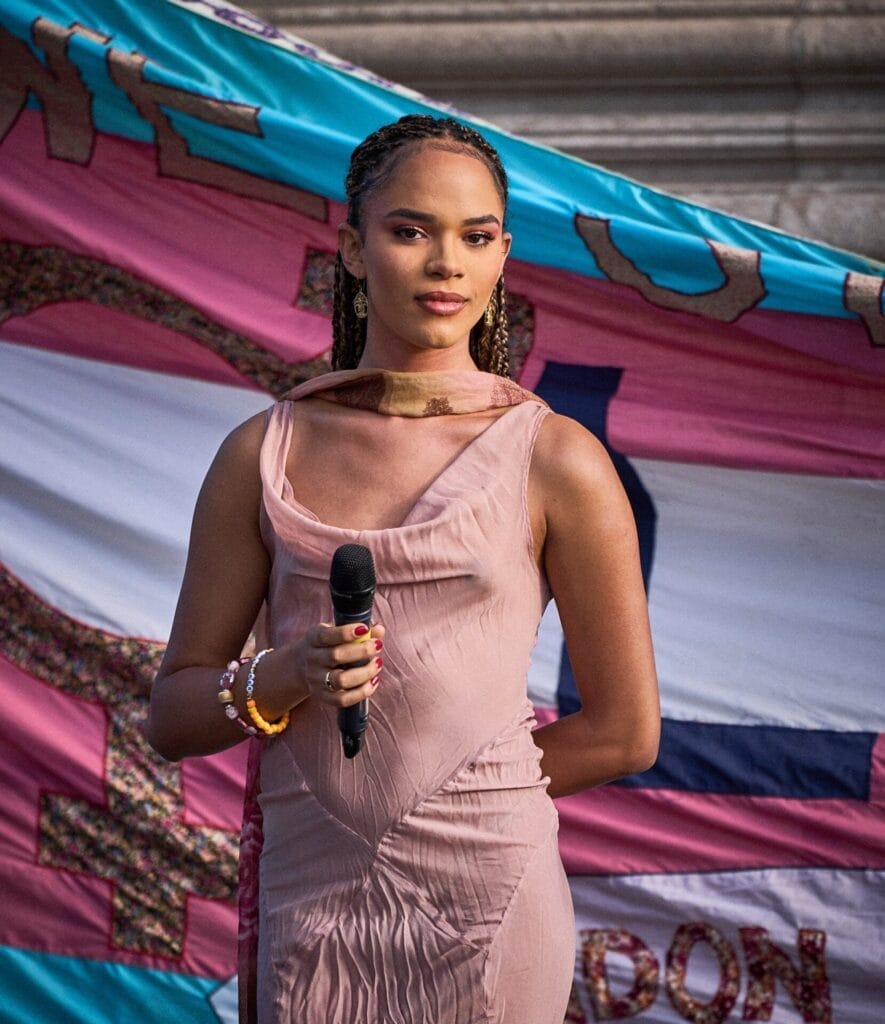
But solidarity cannot end with applause—it must be followed by action. Whether it’s contacting your local MP to demand the protection of trans rights, offering public support on social media, donating to organisations like the Good Law Project, or showing up to protests, every voice matters. In a time where trans rights are under threat, silence is complicity. Together, we can make it clear that equality, dignity, and humanity are non-negotiable.
Follow London Trans+ Pride 2025 on social media here:
Share this article and tag us @GoodStarVibes to let us know what you make of London Trans+ Pride 2025’s theme announcement and all the celebrity support.
Have any thoughts?
Share your reaction or leave a quick response — we’d love to hear what you think!






